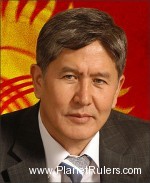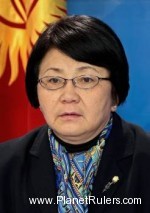Sadyr Japarov, President of Kyrgyzstan (since Jan 28, 2021)
 Sadyr Nurgozhoevich Japarov (born 6 December 1968) is a Kyrgyz politician, was an acting prime minister of Kyrgyzstan in the interim government following the resignation of Sooronbay Jeenbekov amidst electoral protests. Japarov also became acting president of Kyrgyzstan after Jeenbekov’s resignation, but resigned himself on 14 November 2020. On 10 January 2021, Japarov was elected as President of Kyrgyzstan. Japarov has been described as nationalist, and has been compared to politicians like Donald Trump.
Sadyr Nurgozhoevich Japarov (born 6 December 1968) is a Kyrgyz politician, was an acting prime minister of Kyrgyzstan in the interim government following the resignation of Sooronbay Jeenbekov amidst electoral protests. Japarov also became acting president of Kyrgyzstan after Jeenbekov’s resignation, but resigned himself on 14 November 2020. On 10 January 2021, Japarov was elected as President of Kyrgyzstan. Japarov has been described as nationalist, and has been compared to politicians like Donald Trump.
Japarov is married to Aigul Japarova (née Asanbaeva), who is five year his junior.[39][40] She was born in the neighboring village to Japarov’s in the Tüp District.[40] During his acting presidency, she volunteered to help volunteers in the fight against coronavirus.[41] He is also the father of four children, with his eldest son Dastan having died on 26 August 2019 in an accident.[40] His father and mother passed away in September 2017 and March 2019, respectively, during his prosecution and prison term.[42] In either case, Japarov was not released by the State Penitentiary Service to attend the funeral of his parents.[42] It is known that one of his brothers owns one of the coal mines in the north of the country.
Sooronbay Jeenbekov, Former President of Kyrgyzstan
 Sooronbay Sharipovich Jeenbekov (born 16 November 1958) was the Prime Minister of Kyrgyzstan from April 2016 to August 2017. Jeenbekov was born in Biy-Myrza, Osh Region to a collective farm manager and a housewife. His brother, Asylbek Jeenbekov, is also a politician. Jeenbekov has nine siblings in total. Jeenbekov attended the Kyrgyz Academy of Agriculture, graduating with a degree in zoological engineering. In 2003, he completed further studies, graduating in accounting from the Kyrgyz National Agrarian University.
Sooronbay Sharipovich Jeenbekov (born 16 November 1958) was the Prime Minister of Kyrgyzstan from April 2016 to August 2017. Jeenbekov was born in Biy-Myrza, Osh Region to a collective farm manager and a housewife. His brother, Asylbek Jeenbekov, is also a politician. Jeenbekov has nine siblings in total. Jeenbekov attended the Kyrgyz Academy of Agriculture, graduating with a degree in zoological engineering. In 2003, he completed further studies, graduating in accounting from the Kyrgyz National Agrarian University.
Jeenbekov started his career at the Lenin School in the Uzgen District, where he worked as a teacher at 18 and taught Russian and literature. In 1983, he became the chief livestock specialist of the Soviet farm in the Soviet district of Osh region and continue to work in the position for about five years. In November 1988, he managed to obtain a job as an instructor in the district committee of the Communist Party of Kyrgyzstan in the Soviet district of the Osh region. After a few years, he became the director of the party committee.
After entering politics, in 1993, Jeenbekov was elected chairman of the Kashka-Zhol collective farm in Kara-Kulja District. He became a Deputy of the Assembly of People’s Representatives in 1995. In 2007, he became the Minister of Agriculture, Water Resouces and the Processing Industry. In 2010, he served as the Governor of the Osh region, and in 2015, he was appointed as Director of the State Personnel Service. In March 2016, he was appointed as First Deputy Head of the Presidential Administration, before his appointment as Prime Minister of Kyrgyzstan.
Jeenbekov resigned from the post of Prime Minister on 21 August 2017, after being named as an official candidate in the 2017 presidential election. He stated that he “[wanted] to be in an equal position with other presidential candidates.”
The election was held on 15 October 2017. Kyrgyzstan’s central election commission reported a total of 1.7 million votes cast, of which Jeenbekov won 54.3 percent. Jeenbekov’s election marks the first democratic transfer of power in a Kyrgyz election. Azay Guliyev confirmed the election to be one of the few peaceful elections in Kyrgyzstan’s history.
Source: https://en.wikipedia.org/wiki/Sooronbay_Jeenbekov
Almazbek Atambayev, Former President of Kyrgyzstan (elected on Oct 30, 2011)

Atambayev was an unsuccessful candidate in the October 2000 presidential election, receiving 6% of the vote. Atambayev served as the Minister of Industry, Trade and Tourism in the government from 20 December 2005 until he resigned on 21 April 2006.
In November 2006 he was one of the leaders of anti-government protests in Bishkek, under the umbrella of the movement ‘For Reform!’ (За Реформы). He was also involved in earlier protests in late April 2006.
On 26 December 2006 Atambayev rejected calls from other lawmakers for a dissolution of the Supreme Council, saying, “It is impossible for this Parliament to be dissolved at least until May [2007], and it has to adopt all the laws. Otherwise there will be a war in Kyrgyzstan, because even if Parliament adopts the [proposed] authoritarian constitution, I will tell you openly, we will not accept it. It would be a constitution adopted illegally. Then we would take every [possible protest action]. We are ready for that.”
Following the resignation of Prime Minister Azim Isabekov on 29 March 2007, Atambayev was appointed acting Prime Minister by President Kurmanbek Bakiyev. He was then confirmed in parliament by a vote of 48-3 on 30 March. He is the first prime minister in Central Asia to come from an opposition party. On 11 April, he tried to address a large protest in Bishkek demanding Bakiyev’s resignation, but was booed by the protesters.
Bakiyev announced the resignation of Atambayev’s government on October 24, 2007, following a successful referendum. The government was to remain in office until after a parliamentary election in December.
Nonetheless, Atambayev resigned on 28 November 2007; Bakiyev accepted the resignation, while praising Atambayev for his performance in office, and appointed Acting First Deputy Prime Minister Iskenderbek Aidaraliyev in his place as Acting Prime Minister. Edil Baisalov of the Social Democratic Party claimed that Atambayev was forced out of office because he was an obstacle to alleged government interference in the parliamentary election.
Roza Otunbayeva, Former President of Kyrgyzstan (since May 19, 2010)
Roza Isakovna Otunbayeva (Kyrgyz: Роза Исаковна Отунбаева, Russian: Роза Исаковна Отунбаева; born August 23, 1950) is the President of Kyrgyzstan, following the 2010 revolution which led to the ousting of then President Kurmanbek Bakiyev. She is a former foreign minister and head of the parliamentary caucus for the Social Democratic Party of Kyrgyzstan. Otunbayeva is the first female President of a CIS/SCO member state.
Otunbayeva was born in Osh, Kyrgyz SSR, USSR in a family of Isaac Otunbayev, a member of the Supreme Court of Kirgiz SSR. She graduated from the Philosophy Faculty of Moscow State University in 1972 and went on to teach as senior professor and head of the philosophy department at Kyrgyz State National University for six years. In 1975 she became Candidate of Sciences after defending dissertation named “Critique of falsification of Marxist-Leninist dialectic by the philosophers of Frankfurt school”. Otunbayeva is married and has two children. She is fluent in English and Russian in addition to Kyrgyz.
In 1981, she began her political career as the Communist Party’s second secretary of the Lenin raion council (raikom) of Frunze (current Bishkek). In late 1980s, she served as head of the USSR Delegation to UNESCO in Paris, and later as the Soviet Ambassador to Malaysia. By 1992, the now independent Kyrgyzstan was led by Askar Akayev, who chose her to be both Foreign Minister and Deputy Prime Minister, positions she held until later that year when she became her country’s first ambassador to the USA and Canada. She returned to her original post in 1994, remaining there for 3 years. In 1998-2001, she served as the first Kyrgyz ambassador to the United Kingdom. In 2002-2004, she was the deputy head of the United Nations special mission to Georgia.
Upon her return to Kyrgyzstan in late 2004, Otunbayeva became politically active. In December 2004, she and three other opposition parliamentarians founded the Ata-Jurt (Fatherland) party in preparation for the February 2005 parliamentary elections.
She was barred from becoming a candidate for the 2005 legislative election due to a previously enacted law requiring prospective MPs to have resided in the country for 5 years prior to the elections. Her time as ambassador to the United Kingdom prevented her from meeting this criterion. She met this requirement in 2010, so she is eligible to run for the post.
Otunbayeva was one of the key leaders of the Tulip Revolution in Kyrgyzstan which led to the overthrow of President Akayev. Subsequently she served for a few months as Acting Foreign Minister in the interim government of then prime minister (and acting president) Kurmanbek Bakiev. After Bakiev was elected President and Feliks Kulov became Prime Minister, Otunbayeva failed to receive the required parliamentary support to become Foreign Minister. She then ran unsuccessfully in a parliamentary by-election a few months later. Otunbayeva played a key role in November 2006 protests that pressed successfully for a new democratic constitution.
She was the co-chairwoman of the country’s Asaba (Flag) National Revival Party for a short term.
In December 2007, Otunbayeva was elected to Jogorku Kenesh – the parliament of Kyrgyzstan – on the candidate list of the Social Democratic Party of Kyrgyzstan. She served as the head of the parliamentary group of the opposition SDP beginning in October 2009.
On April 7, 2010, Otunbayeva was selected as head of a Kyrgyz interim government, following widespread rioting in Bishkek and the ousting of President Kurmanbek Bakiyev.
Bakiyev fled the Jalalabad area as the riots became more violent. Unable to rally support, he signed a resignation as president and on April 10, 2010 and left the country for Kazakhstan. Nine days later he went to Minsk, Belarus, where he was given protected-exile status. On April 21 he recanted his resignation and declared that he was still president of Kyrgyzstan. Otunbayeva vowed to bring him to trial.
As interim president Otunbayeva has four male deputies. Otunbayeva is considered to be unusual as there are few women in politics in Kyrgyzstan. Her first conversation after she came to power was with Russian Prime Minister Vladimir Putin. Otunbayeva has declared that new elections will be called in six months and that she will act as president until then.
With violent protests in support of ousted President Kurmanbek Bakiyev continuing in Jalalabad, the home city of the former President, it was announced on May 19, 2010, by the interim government that elections will be delayed until 2011 and that Otunbayeva was named as President. However, Otunbayeva would be prohibited from running in the presidential election and her term will end on December 31, 2011.


